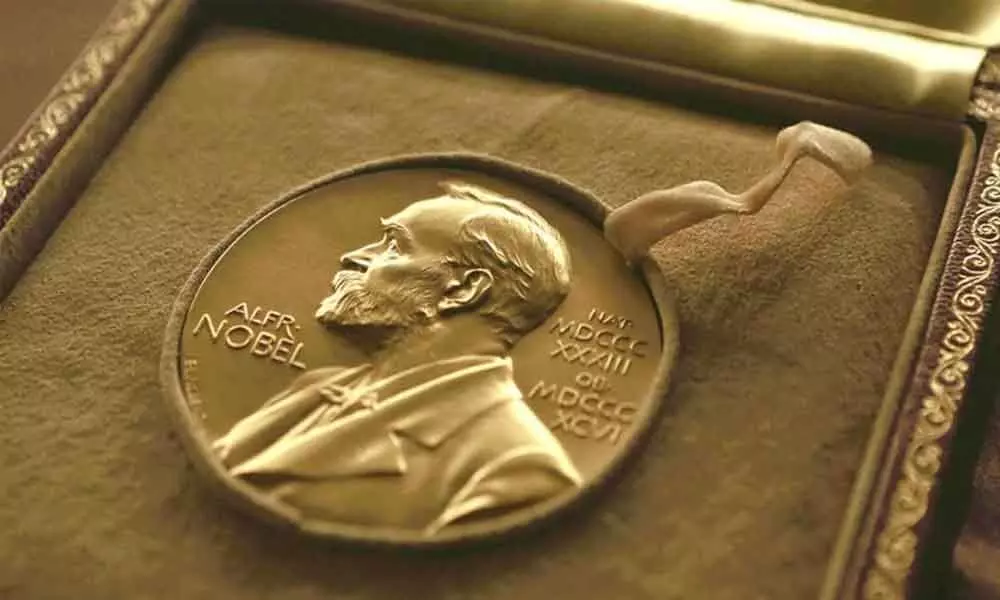Live
- Narendra Modi to visit AP on May 3,4.
- KCR to Kick Off Election Campaign under Palamuru Porubata in Mahbubnagar
- EC announces schedule for Graduate MLC constituency
- YSRCP to focus on development of Vizag: KK Raju
- No ‘truck’ with MIM, shall fight on devpt plank, asserts Sameer
- Special classes for ZP institutions HELP IN IMPROVING academic performance
- SR students get top JEE ranks
- Avanthi exhorts party cadre to strive hard for YSRCP’s victory
- Annual Kumbhotsavam begins at Sri Bhramarambikadevi temple in Srisailam
- Hyderabad: DEO briefs election observers on polling measures
Just In
Why didn't Coronavirus vaccines win a science Nobel this year?


Nobel prize
‘Nobel folks should have done something’, scientists express surprise and disappointment at the omission
And the winner is … not COVID-19 vaccines. Despite sky-high hopes that one of the Nobel committees would recognize research on vaccines that have been administered to billions of people and have saved countless lives, this year's science Nobels instead went to fundamental advances that had been tipped to win for years.
Some scientists expressed surprise and disappointment at the omission of COVID-19 vaccines, particularly those developed using messenger RNA technology, which have launched a new class of vaccine.
"The Nobel Prize folks could have done something with this year's award to directly aid global health efforts during a 100-year pandemic. And they chose not to. This is utter dereliction. It is an indefensible decision that will cost lives," Alexey Merz, a cell biologist at the University of Washington in Seattle, wrote on Twitter on 5 October, after research into the mechanisms behind senses won this year's medicine or physiology prize.
But Nobel prize insiders and watchers say that timing, technical details and politics meant that a nod this year was a long shot. However, the impact of Covid-19 vaccines — and the underlying advances — indicate that it shouldn't be long before researchers behind the work get a call from Stockholm.
"The development of mRNA vaccines is a wonderful success story that has had enormous positive consequences for humankind. And we're all very grateful to the scientists," says Göran Hansson, secretary-general of the Royal Swedish Academy of Sciences in Stockholm, which selects the prize winners. "This is a kind of discovery that will receive nominations. But we need to take time."
The timing didn't work in favour of a COVID-19 Nobel this year. Nominations for this year's prizes had to be submitted by 1 February. This was more than two months after the first mRNA vaccines, and some others, proved their mettle in clinical trials, but before their impact on the pandemic was fully clear, Hansson notes. "Follow-up is really still happening now." History was also against a nod for COVID-19 vaccines. The gap between a discovery and recognition with a scientific Nobel prize has grown over time, says Santo Fortunato, a physicist and director of the Indiana University Network Science Institute in Bloomington, and it now stands at an average of more than 30 years.
The first experimental mRNA vaccines were tested in the mid-1990s, but key advances underlying the jabs developed by Moderna in Cambridge, Massachusetts, and by Pfizer in New York City and BioNTech in Mainz, Germany, didn't come until the 2000s. And one could argue that the technology's impact wasn't apparent until this year.
But Fortunato says that major discoveries do tend to be recognized much more quickly. One potential parallel for mRNA vaccines is the detection of gravitational waves. The existence of gravitational waves was predicted by Albert Einstein in 1915, but it took a century for researchers to develop the tools to detect them directly.
Researchers announced their discovery in February 2016, and scientists behind the observations and theoretical work won the 2017 physics prize. For COVID-19 vaccines, "I'm not surprised it didn't happen this year. I have no doubt it will be awarded really shortly," Fortunato says.

© 2024 Hyderabad Media House Limited/The Hans India. All rights reserved. Powered by hocalwire.com






